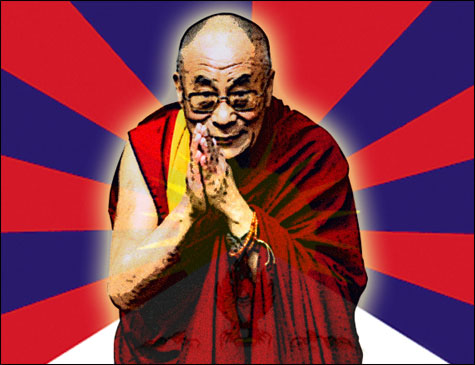
Thanks to the Olympics, the world’s attention is trained as it never has been before on China, the superpower that many believe will economically and politically dominate the 21st century, just as the United States dominated the 20th. For those, such as myself, with deep misgivings about what this international transformation of power and influence will entail, the plight of Tibet — its people, its environment, its religious and cultural traditions — provides a sobering lesson in reality.
It is difficult to imagine an American — perhaps
any Westerner — with a greater sympathy for, and understanding of, Tibet than scholar-activist Robert Thurman, a Columbia University professor who also happens to be the first American ever to be ordained a Buddhist monk. Presiding over Thurman’s ordination was the Dalai Lama, then as now the spiritual and temporal ruler of Tibet, who has lived in exile for the past 49 years, following a failed uprising against the Chinese, who entered the nation in the 1950s.
Thurman’s most recent book, Why the Dalai Lama Matters (Atria/Beyond Words), is the fruit of a 45-year-long friendship between the two men. A week before the beginning of the Olympics, I spent an hour on the phone with Thurman discussing intersecting issues that concern China, Tibet, and the world. What follows is an edited transcript of that conversation.
When you speak, can readers assume that you are speaking for the Dalai Lama?
Not precisely. I quote the Dalai Lama frequently to support many of my points. I also have other inspirations. I want him to have plausible deniability in terms of his formal relations with the Chinese. The Chinese, however, do not seem interested in negotiation. They like to preach and to scold — it is hard to get a word in edgewise. My aim is to explain to people what the Dalai Lama wants without making the Dalai Lama responsible for my explanation. For example, take the case of [the Paramount Leader of the People’s Republic of China] Hu Jintao. When I say that the Dalai Lama and Desmond Tutu would nominate Hu Jintao for a Nobel Peace Prize if he or any other Chinese leader had the balls to stop acting like a 19th-century imperial power or a 20th-century superpower wannabe, I am explaining a course of action that would quite naturally result if the Chinese began acting in a humane way and granted the Tibetan people autonomy. I’m suggesting what the Dalai Lama might do, could do, and what would follow.
While the Dalai Lama is widely revered in the west, he is seen as ineffective by some younger, more militant elements among tibetan exiles and resisters.
The press, I think, is hyping that. At times, the press takes too narrow a view of many things. Americans and the Europeans support the Dalai Lama. The Japanese also support the Dalai Lama. The Indian people, too, support the Dalai Lama, as do all the Buddhists in Southeast Asia. (Although it is true that Southeast Asian governments like the military junta in Burma or the more militant new government in Sri Lanka — both funded by the Chinese — don’t support the Dalai Lama. But governments do not always represent their people.)
Support in the East and the West is wide and deep, because the Dalai Lama is a peace teacher. There is impatience among his own people because his best efforts have produced no change in behavior in the Chinese. In fact, since the Soviet Union deconstructed, the Chinese have become more frightened, more determined to hold on to real estate that is not theirs. Not just Tibet, but also Mongolia, Xinjiang, even Manchuria. These are really just colonies. They do not belong to China.
So, the young people, are just saying, “Look, we can’t be like this forever. We’re going to get tougher. The Dalai Lama is being too nice. He’s a Buddhist, we love him, but he’s a Buddhist.” The fact of the matter is that, if the Chinese persist in their violent and repressive behavior, there will be real and serious danger when the Dalai Lama passes away. Once the Dalai Lama is a child again [meaning the child successor to the current Dalai Lama], he will not be able to exercise his authority and his charisma for maybe 15 or 20 years. Then, anything could happen with the Tibetans. They once did fight in a guerilla war against the Chinese. The next interim period could become very dangerous to China. People might do well to worry more about long-term Tibetan resentment of the Chinese rather than any short-term Tibetan frustration with the current state of affairs.
Some political figures who call themselves realists say that China is doing in tibet what stronger nations always do to weaker ones. Those efforts to re-settle tibet with Chinese nationals are akin to the settlement of the Americas with the descendents of Europeans.
Those are the same realists who brought us the Iraq quagmire. Those are the realists who brought us all kinds of stupid behavior, such as Vietnam. Those are the same kind of realists as in Russia who brought the Russian people Afghanistan and Chechnya.